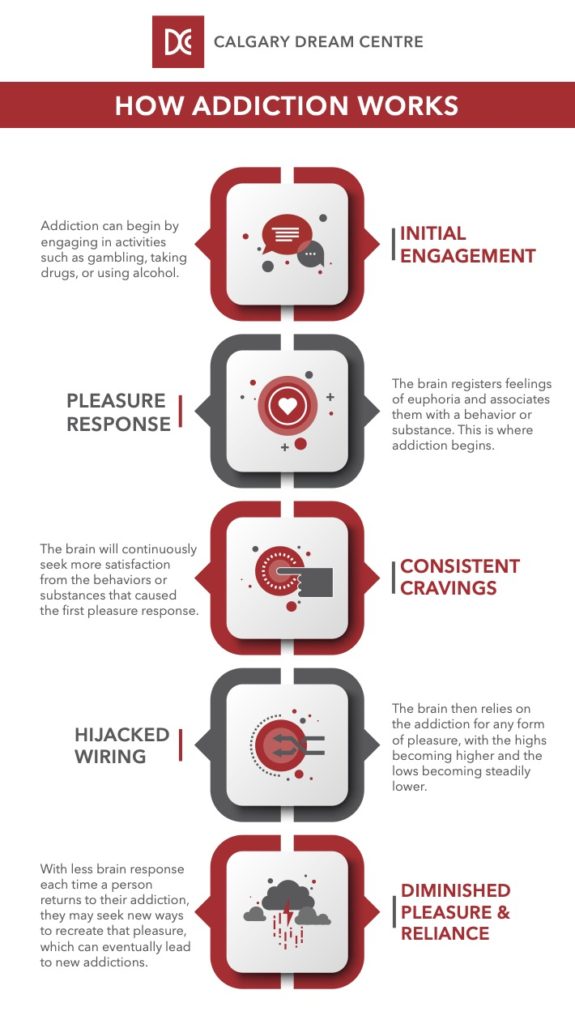When an addict begins their recovery journey, they must develop a support system to help prevent relapse, encourage, and create an outlet to vent frustrations. Their support system is often a critical resource that can make their recovery journey far less daunting.
As a part of your loved one’s support system, it’s essential to understand the nature of addiction and the steps you can take personally to provide active help when they need it.
Understanding Addiction
Addiction is a chronic mental illness that affects millions of Canadians. Approximately 21% of Canadians suffer from addiction to substances like drugs and alcohol or behaviours such as gambling.
Addiction begins when the brain’s reward system is overwhelmed by positive feelings associated with addictive substances or behaviours. The most effective way to think about addiction is to understand the feeling associated with an action, not the substance or behaviour itself.
For example, a person addicted to gambling is searching for the thrill they get when they win a hand of poker or a handful of money in blackjack. Similarly, a person addicted to a substance like methamphetamine is seeking the stimulation of dopamine in the brain’s reward centre.
It’s essential first to understand how addiction occurs, and why a person may rely on substances and behaviours to support them effectively. The central pillar of helping an addict recover is practicing empathy for them in a complex and often dangerous situation.

Active Listening & Understanding
Addiction recovery can be a lonely process. As a person supporting an addict in recovery, you must understand you play a vital role in making your loved one feel supported. Learning and practicing active listening and trying to hear what they are going through can make the process more straightforward.
It’s also crucial to understand that a person recovering from addiction likely feels guilt for their past actions. Allowing them to make amends and demonstrate through their actions that they are making strides to improve is a gift you can give to encourage them on their recovery journey.
Understand that addiction is a disease. Recovery is an active process that continuously evolves; even if you can’t see it, your loved one needs your support and understanding.
Removing Triggers
It’s helpful to abstain from the substances or behaviours that an addict is recovering from when supporting them during their recovery. For example, if your loved one is recovering from alcoholism, having alcohol readily available can make their recovery unnecessarily challenging.
If you choose to engage with substances or behaviours your loved one is recovering from, try to avoid doing so in front of them. It’s also crucial to remove environmental triggers like stress which can cause a recovering addict to turn to their addiction for comfort.
Try to create a calm environment where your loved one is reminded of why they are engaging in the recovery process. Take note of situations, objects, or your behaviours that cause a relapse and actively take steps to remove them.

Creating Your Support Network
Supporting your loved one in their addiction recovery may be tiring. You may spend time constantly thinking of situations that can trigger their reliance on addiction. Understandably, you may experience compassion fatigue.
Compassion fatigue is a common condition when providing emotional care that can cause:
- Feelings of powerlessness
- Increased anxiety
- Reduced self-care motivation
- Difficulty sleeping & focusing
- Loss of interest in activities
As much as you wish to show your loved one empathy, remember to offer the same level of compassion for yourself. Cultivate a network of people you can trust who are removed from your loved one’s recovery. Having an outlet allows you to take care of yourself, which in turn ensures you’re ready and able to help your loved one on their recovery journey.
Seek Professional Guidance
When it comes to supporting recovery, it’s okay not to have all the answers. Addiction recovery takes time—it’s often a lifelong journey that you and your loved one will go on together. Part of creating a better support system for everybody involved is seeking professional guidance when necessary. Professional addiction support can transform your loved one’s recovery. Whether you need resources or access to specific programs that provide structure to your loved one’s recovery. You don’t have to do this alone—help is available and ready for you to access right now at Calgary Dream Centre.



